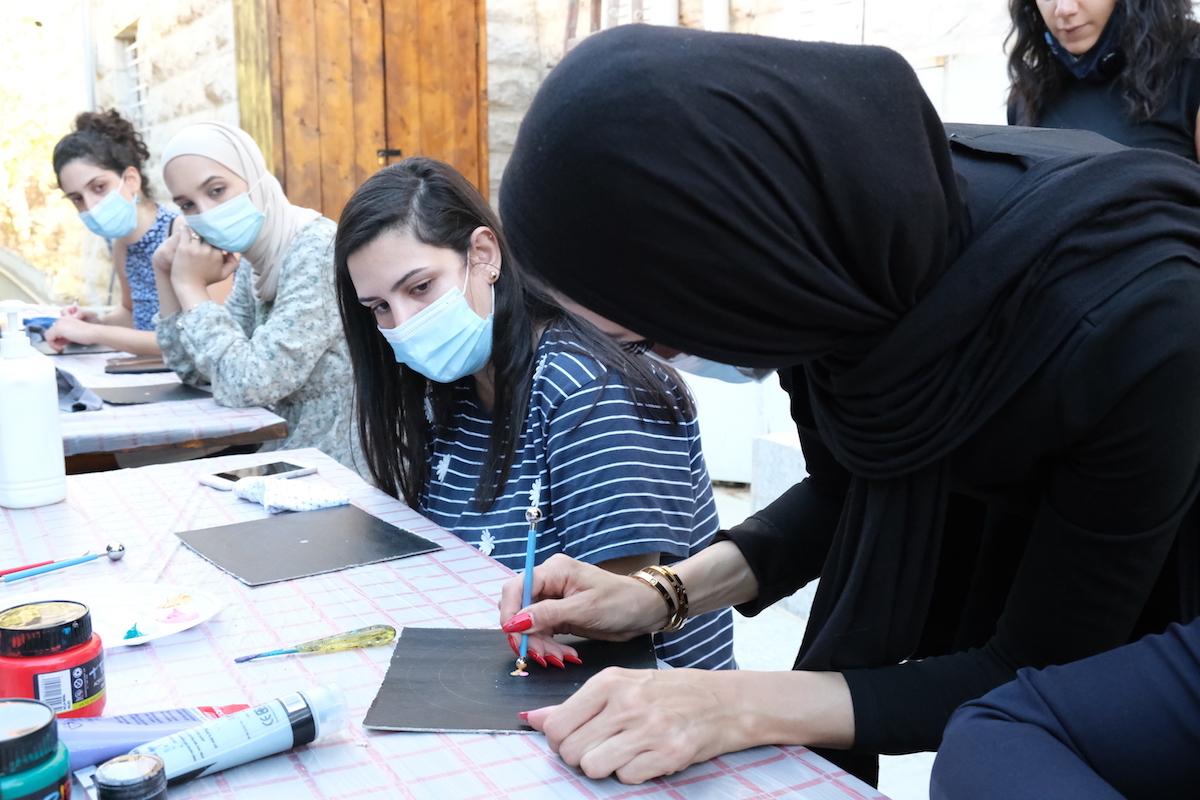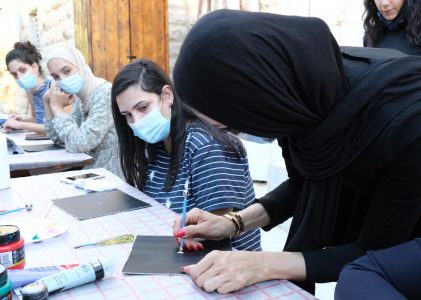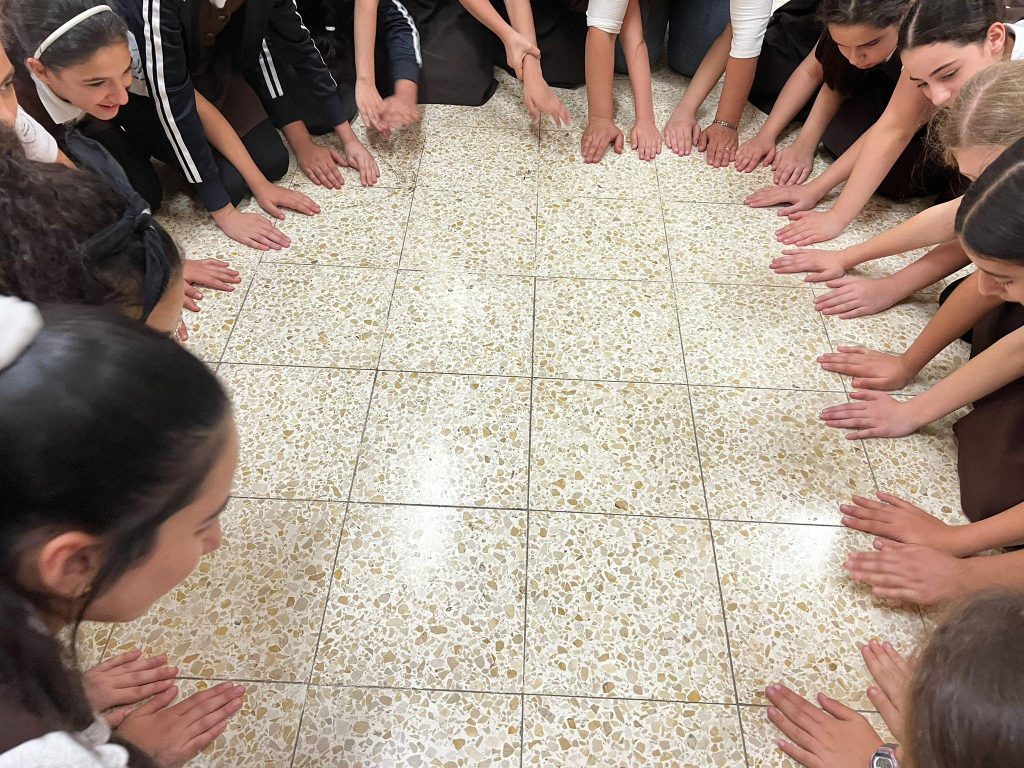
Carrying on in the middle of violent conflict requires skill, resilience, and nous. For the Palestinians, the last 100 years have brought colonisation, expulsion, and military occupation, followed by a long and difficult search for self-determination and for coexistence with the nation they hold responsible for their suffering and loss.
According to the Civicus Monitor, the people of Palestine are ‘repressed’. Civic freedoms in Palestine continue to deteriorate with an escalation of attacks on civil society organisations, journalists, and human rights defenders by the Israeli Occupying Forces.
The conflict continues to be ignored by the world. Aarti Narsee, Civicus Civic Space Research Officer, has recently said:
The deterioration of civic freedoms in Palestine due to increasing attacks by Israeli Occupying Forces can no longer be ignored. It’s time for democratic governments to break their silence and condemn Israel’s apartheid regime of systematic racial domination and oppression over the Palestinian people as a whole and to impose economic and diplomatic sanctions on Israel.
Yet, the Dalia Association does its best to enable Palestinians to live flourishing lives. ‘Dalia’ in Arabic means ‘grapevine’. Nearly every house in Palestine has a Dalia plant which, if you take care of it, will feed you, shelter you, and provide beauty for generations. This is exactly what the Dalia Association does. As a community philanthropy rooted in the dreams of Palestinians, it is ‘a mechanism for us to become our own donors, investors and decision makers.’
To learn how the work is shaping up, Ese Emerhi (Global Fund for Community Foundations) and Barry Knight (GFCF advisor) caught up with Samar Awaad, Executive Director of Dalia Association, and Lina Ismai’l, Community Programs Officer, to learn more about their work in building community philanthropy through the Giving for Change programme. This interview was conducted in October 2022.
Current situation in Palestine
Barry Knight (BK): How are things in Palestine? What’s the main situation right now?
Samar Awaad (SA): Well, the situation right now – the political situation – is the Israeli occupation and lack of access to travel from one place to another for Palestinians. Sometimes, even villages within cul-de-sacs need permission to move from one place to another, and this is a challenge. In a sense, we are in an apartheid situation. I don’t know if anything quite like this situation exists anywhere else in the world. We are living in a big prison, but in the West Bank, we don’t really feel it because it’s sort of a bubble in Ramallah. If I want to travel to Jericho, I must make sure someone is with me so I wouldn’t be attacked or have my trip in some way jeopardized by the settlers. This closure limits accessibility of people, which also has an impact on implementing projects. For example, though we are implementing this programme in Gaza, we have not been able to go and visually monitor the projects, despite having two staff members there. They can’t leave Gaza and we can’t enter. And to think that Gaza is only an hour and fifteen minutes away from Ramallah [where we are]. This occupation challenge is something Palestinians live with all their lives. It’s like a dream to imagine life without occupation.
Lina Ismai’l (LI): In the past month, there’s been an escalation of violence against Palestinians. There’s a refugee camp that is now closed off and food supplies cannot enter. There’s been demonstrations and protests, even across the whole West Bank. A couple of days ago we were on a general strike. Every day, we open the newspapers and read about another martyr here and there. It’s not an easy situation. In addition to this, there are attacks on civil society organizations. This year, the Israeli military forces have attacked seven organizations, and one of them is a partner of ours – the Bisan Center. All this, of course, is in addition to the Palestinian Authorities’ enforcement of the decree of law constricting the civic space for civil society. Currently, we have concerns for us even traveling to a nearby city.
Working through conflict
BK: How are you able to function given these apartheid conditions, as you put it?
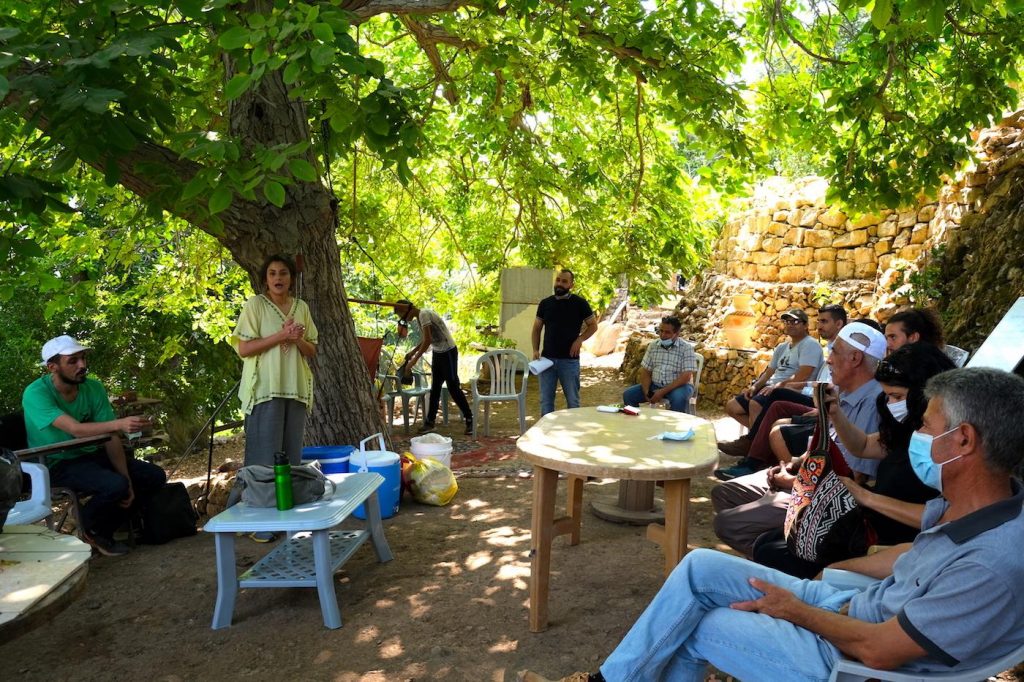
SA: We are very much aware of our movement. Yesterday, our office closed due to the general strike and our field officers are rescheduling their appointments and their movements according to the current situation. So, we’re just playing it by the ear. Whenever there’s an option here or there or an access to a certain community, our field officers are there. We have moved to online monitoring meetings with our field officers; they have access to Gaza, but we do not.
With the escalation of violence in the North, it has now become almost closed. There are now small Israeli settler militias – they are armed – and they work closely with the Israeli military. This is a new movement we have been closely monitoring – mostly on TV. There are false accusations of Palestinians aggressively attacking the settlers, but who is really attacking who? Our staff sometimes see these settlers on their way home and at times must take another route to avoid them, which can make the journey last almost an hour and a half.
Ese Emerhi (EE): What has been the psychological effects of this on your work? As you know, on the #ShiftThePower network map, one of the 12 areas of collaboration is on “self-care and solidarity.” I see the work of Dalia Association as being embedded in this one collaboration area. Who do you go to for inspiration, personal support, and renewed energy in the face of persistent resistance? If you can talk freely about this, and if this is now a “new normal” having to deal with the daily anxiety and stress of this occupied situation.
SA: Absolutely, this affects us very closely. We tend to shrink in and stay home. I haven’t been out of Ramallah for the past two months. Can you imagine what this must be feel like? If you want to travel, the anxiety and anticipation that comes with it. You tend to shrink in your bubble and stay there. Every now and then, we can leave and travel out but it’s usually to somewhere close by that we know is safe.
LI: I would add that there is a general feeling of depression amongst the whole population. And we see and live this closely. We work with communities with youth and women-focused initiatives and it’s getting harder to even talk about mobilization. Imagine checking the news and reading about closures and death and being worried about your family constantly. At the same time, you have your normal work routine which is very stressful. We sometimes try to ignore these feelings and push it aside instead of talking about them. But at times it can suddenly hit you, making it hard to function, because we have been keeping it inside. Nothing about our lives is normal. I don’t know how we function really, working more than eight hours a day like this. But the work has somehow become our coping mechanism.
When it comes to self-care, we are not really putting that much effort into [self-care]. In the future, we hope to have an internal staff meeting as women to talk through some of these things. How can we mobilize women? What is the psychological part? Hopefully we can work on this in the coming months.
BK: That’s important. The long-term effect of fear and anxiety affects the physical body and your psyche. How do you stay positive in those circumstances? My heart goes out to you and my respect is very high, the fact that you are managing to do so much within this context.
SA: I’ll tell you how I personally manage – I do my yoga three times a week and I take walks outside at least once a week. That’s what I do to stay grounded and centred. I also listen to intuitive coaches which has helped me to do the mental switch of not reacting out of fear but instead reacting out of love. I am shifting my whole way of being towards this new concept.
BK: That’s a very powerful transition if you can make it!
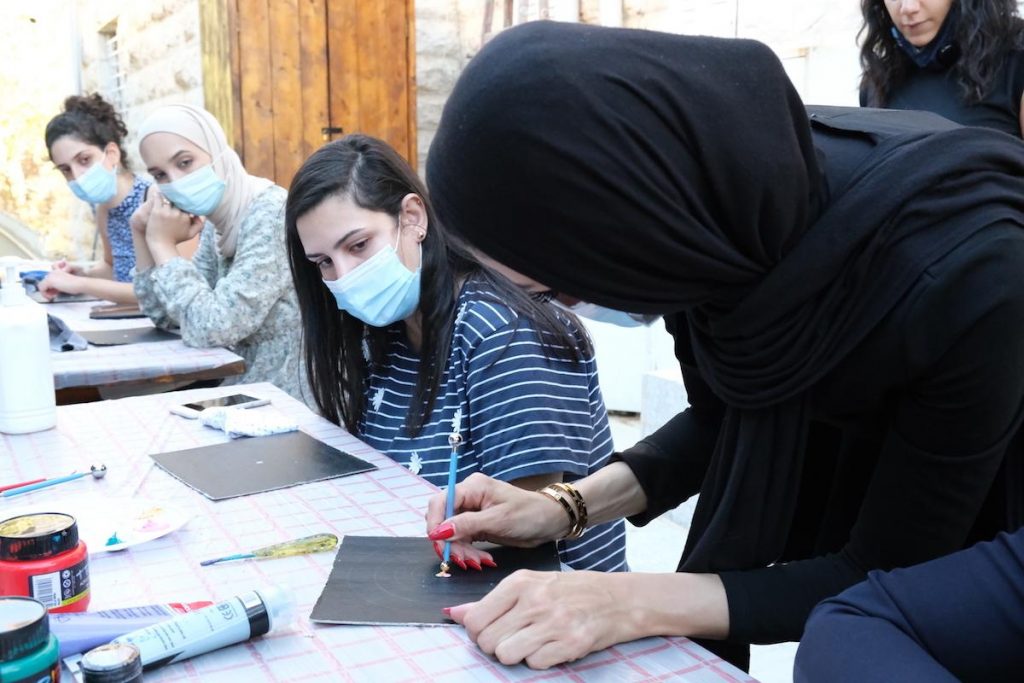
Giving for Change programme
BK: How is the Giving for Change programme? Has it helped in the way you interact with your work or added an extra burden?
SA: It’s amazing; we love the Giving for Change programme, there’s a lot of energy around it. We are very proud that there is this programme that we can excel in, and which can give our communities hope. We hear of the work our coordinators are doing in Gaza and the energy coming out of it.
LI: For us, the Giving for Change programme is more of a consolidation of our other programs – working with youth and women, and in our thematic area of food sovereignty. And we designed the programme for us to start at the grassroots working with youth-led and women-focused initiatives to mobilize them to see what their needs are and how active they are within their communities, and from there we push forward. Our technical grants are another way of providing moral support, as our field coordinators are always there to work with them.
We developed a community mobilizing and community philanthropy curriculum and turned it into a camp to implement it. Before, it was a series of learning sessions, but in a camp setting it’s different – you see the youth working together, spending time together and bonding, and bursting through all these mental and physical/geographical barriers. It’s a safe space for them to voice out what they feel, what their needs are, and what resources they have to tackle the challenge. This is really one of the highlights of the Giving for Change programme, allowing us to develop our own curriculum. One outcome of this is that the youth always end up not wanting to leave the camp. The challenge before was getting youth to leave their lives for three or four days to come to camp and when they first come to the camp, they are tired and depressed. But now with the success of the curriculum, they want to stay even longer because everyone is feeling connected. They keep calling us and asking when are we having another gathering?
SA: There’s diversity in the camp as well. They come to camp with all these different roles they have in their personal and public spheres and sometimes these spheres do not mix, where communication is limited. And by having them all together in one place, bridging all differences, they get to see that they have more in common as Palestinians, you know.
BK: That’s a great indicator and a testament to trust based relationships that sustains the work. And it’s a sharp contrast to the political situation you are living in where there is no trust. And that’s powerful. I’ve been following the progress of Dalia Association for many years and one of the things that’s always struck me as very powerful is the way you’ve built communities and used community philanthropy as a method of participatory grantmaking. Are you still using those kinds of approaches, notwithstanding the kind of oppression that you’re facing?
LI: Yes, we are. The grant cycle and participatory grantmaking are the same, and though we have experimented with different approaches, it’s all been participatory. When we started, for example, with participatory decision making on grant provision and selection, it was open to communities then. Now we are experimenting with having a committee of community members who can be part of making grant selections.
With regards to community philanthropy, we are pushing this with the communities and initiatives we work with by letting them know that whatever they contribute is valuable and a resource. If your contribution is by volunteering or providing an equipment, that is community philanthropy. They start to see how they can mobilize their own resources in addition to the grants that we give them for their initiatives.
BK: That’s a really important perspective, that community resources are much more than money, and that we all have capacities that we can bring to the table if we think hard enough.
SA: Another thing we are doing at Dalia is to network; and to network is to network with the NGOs themselves. We are networking as individuals, as communities, and as NGOs. For example, we have an agreement with the Expertise Forum. This is a membership organization for the elderly where they have daily activities – yoga, exercise, beading, etc. Their members have volunteered with us, working with us in our store. Whenever we have events, we invite them to our area to participate. We use some of their expertise for our training sessions.
Another partnership we have is with universities. With one university, we are working on a programme with their design department to incorporate our thrift store with their recycling fashion course. There’s another partnership with an organization called SOS where we exchange second-hand clothes for our store. So, we have lots of partnerships on the ground with other NGOs where we support each other and compliment their work.
Advocacy and influencing
BK: I imagine that given the political situation in Palestine that there are real limitations to how you can effectively advocate on key issues. How do you press for the kinds of systemic changes that is needed for your work to be effective?
LI: It’s about context. For example, if it’s a problematic situation with the government, we don’t push our advocacy work. We would rather focus on specific issues or demands. We find pockets and places that we can work and use our advocacy campaigns there – for example, our initiative on disability rights, right of access to public transportation. We are working with grassroots organizations to start their own campaign and to ask for specific demands.
We’ve had conversations with the Minister of Agriculture about food sovereignty and what this means and the difference between it and the current bad agriculture policy, but I don’t think they understood it, despite the position paper we presented. And given the current situation, we recognize that there might not be the political will present to receive input from civil society organizations on this matter. So, we are picking and choosing when to push forward on this advocacy front. Instead, we are focusing on building our strength, our momentum as grassroots and civil society organizations working on community philanthropy. But on another level, we are also exploring how we can highlight community philanthropy with other international donors’ agenda. The challenge is how to locally shift the power and advocate for this way of doing and deciding on the national level with other organizations and donors.
SA: The real challenge for us is in how to locally shift the power and this way of working inside Palestine… we aim to pursue this more in 2023. So, there’s two tracks – the national and the international avenue for advocating for change.
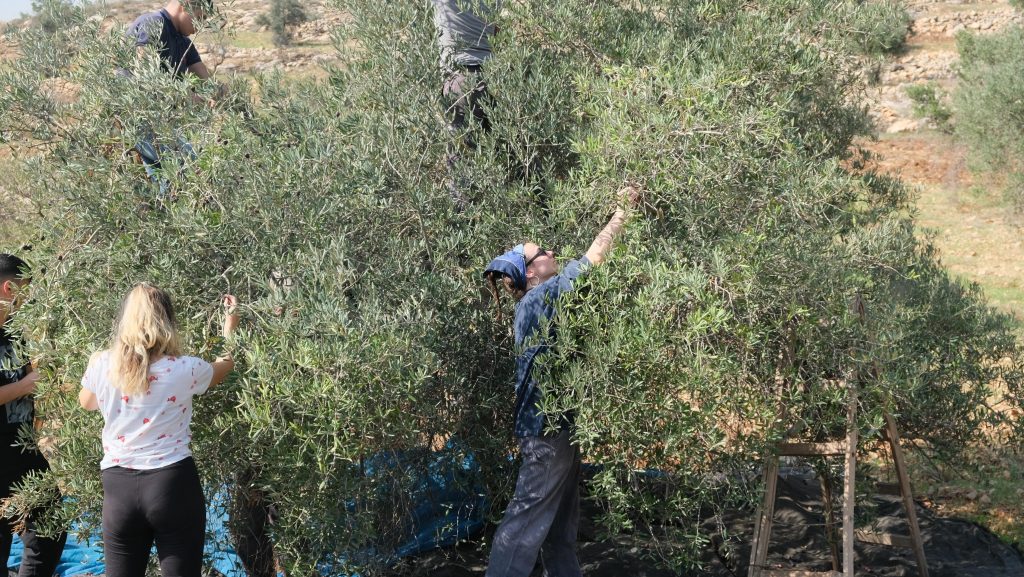
Building connections and what’s next for Dalia Association
BK: How can the Giving for Change programme support you?
SA: I think it’s already doing that. We can, however, target more of the communities and networks we need to reach, both locally and regionally. The programme can help us do that.
EE: How much networking and solidarity building happens with other partners within the Giving for Change programme for you? I’m conscious of not just the physical distance between you and the other six partners on the African continent and even with Brazil, but I hope that there is a sense of connectedness there so that this peer learning and exchange between countries can truly happen.
SA: Thank you for this question. I’ve always felt that Palestine is a bit of an outlier within the programme – we are the only one in the Middle East. The Partner meeting in Accra did a marvellous job in warming up the space for us and making us feel like we are part of a big family. I didn’t want to lose that energy and momentum that was started in Accra coming back, it was a real eye opener.
After the Partner meeting, the film screening we did with the support from the Global Fund on Community Foundations on The Untold Revolution – Food Sovereignty in Palestine also helped to make us feel connected and gave us the opportunity to share our story and that of our regional partners with the rest of the world.
LI: The GfC Family meetings helps us stay connected but if they can be more topic based, it would help us to achieve this peer learning more effectively. For example, when we showed the film screening on food sovereignty, Micaia Foundation reached out to us, and it was nice to have this kind of direct communication with them and we look forward to more things like this happening. After meeting partners in-person at the Accra meeting, the bonding continued into the virtual monthly GfC Family meetings, so as Samar mentioned, it was good to share space together.
EE: Perhaps, Lina, you can help us help you by suggesting some of these topics to be discussed at the GfC Family meetings. It doesn’t matter if the suggested topics are only relevant to you at first, because I think by just bringing them to the agenda setting at the GfC Family meetings, it would help others to know more about your work and your challenges and open the space for more learning. We are also exploring other tactics with the GfC Family meetings, perhaps making it rotational between partners so each month can be dedicated to a specific country, for instance.
SA: You know, when I read the experience of the Uganda NGO Forum on the Treehouse, I was surprised by the similarities between our two countries in terms of challenges we encounter, and I think they are very courageous in their fight with the government. I learned a lot from reading that interview.
BK: One of the things I’ve found with working with the Global Fund for Community Foundations all these years is that the values, the pressures, and the achievements of partners globally are very similar. And that’s how we came up with the framework of assets, capacity, and trust (ACT) for describing this type of work. And one of the things I can offer you in support is to cover you and say the things that you may not be able to say, because if other people say things (on your behalf) it has a different resonance sometimes. We need to protect one another through this programme because we are all trying to do some radical things which are not the mainstream. Any change process against the established order is going to be difficult.
BK/EE: Our last question is this – how do you think about the future? This is more of a big-picture-dreaming type of question so feel free to be expansive.
SA: I would like to serve the communities we work with in a more extensive way, and I need to be networking with other NGOs who have the same vision as well, to celebrate our community service with everyone else, and to get rid of the trauma of our experience together. That is my dream.
LI: For me, my dream is bringing out the inner power of Palestinians and how rich we are as a people, how rich our culture is. My dream is for Palestinians to be able to realize their own capacity and their own resources with trust and pride and for Dalia to be the facilitator of this process. In the end, our hope is to get rid of the occupation and get rid of any control and strings attached to the international aid structure – a true liberation of self and politics. We can find a common language of similarity between ourselves.
BK: If we can really build our own sense of love and working together then that is really powerful. To be able to find the things that unite us as humans is key. This type of mindset of love instead of the fear paradigm has to be the way to move forward.
A version of this article was also published in French and Portuguese.
